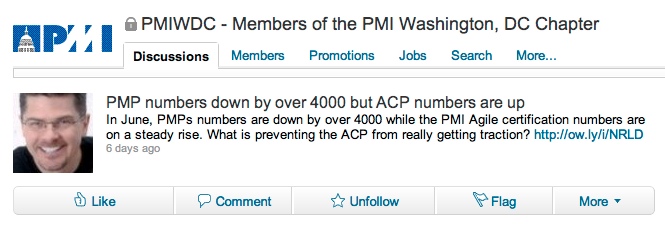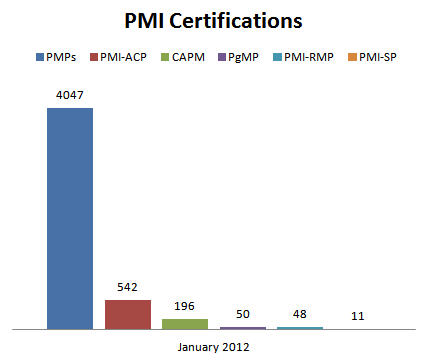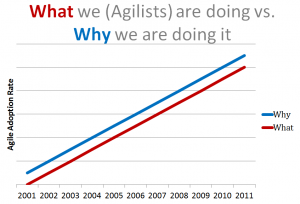 This last weekend, I had an interesting exchange on the PMIWDC LinkedIn Group discussions board. This healthy exchange of viewpoints came about from the following message:
This last weekend, I had an interesting exchange on the PMIWDC LinkedIn Group discussions board. This healthy exchange of viewpoints came about from the following message:
In June, PMPs numbers are down by over 4000 while the PMI Agile certification numbers are on a steady rise. What is preventing the ACP from really getting traction? http://ow.ly/i/NRLD [link to graphic showing the upward trend of the PMI-ACP]
Because that LinkedIn group is not public, I won't include the persons name. Rather, I will refer to him as "Mr. PMP, CSM, ITIL" and include his responses in red. Even if I don't agree with everything he writes, I have to respect a differing viewpoint.
PMP numbers likely vary slightly throughout the year and 4,000 is less than 1%. Plus, in the current economy, I don't think a drop is surprising at all.
Now about PMI-ACP. In my opinion, the PMI-ACP has no market (no one asks for it and, as you note, no one is really seeking it even after PMI lowered qualifying standards to get it). It is simply a me-too certificate competing with already established certifications by Scrum.org and ScrumAlliance.org. Besides, it is mislabeled as Agile when all it talks about is Scrum without ever using the word Scrum--making it even less distinguishable.
Personally, I'd rather see PMI focus its efforts on strengthening the PMP, and the overall body of project management knowledge and practice, than chasing after the latest fads.
[Mr. PMP, CSM, ITIL], interesting opinions. I always find these "corrections" compelling. Everyone can read the August edition of PMI Today (the source of my numbers) and draw their own conclusions. It could be there were 4000 people who really weren't project managers in the first place, thinking they needed a PMP, and then realized they really did not. We'll never know for sure.
As for the PMI-ACP, the qualifying standards were corrected while the certification was still in pilot. I know this because I was in Miami with PMI when it happened. It just took several months to get the change implemented in the application process. At least there is a qualifying standard. You and I both have a CSM, yet we both know there is no qualifying standard for that.
The PMI-ACP is not all about Scrum. Again, I know this because I helped create the ACP and because I am the Co-Lead of the ACP support team at the PMI Agile CoP. I won't disagree that a large percentage of the ACP is Scrum related but in VersionOne's latest State of Agile survey, a majority of Agile practitioners are using Scrum to deliver value to their respective organizations. I think the certification is pretty representative of contemporary Agile practices.
If you'd rather PMI focus its efforts on strengthening the PMP, I'm curious how you will feel about the upcoming PMBOK Guide revision and Software Extension. Both include Agile knowledge and practices. Does that mean PMI is chasing after the latest fad or is it evolving?
Derek, I'll admit the 5th edition draft PMBOK is troubling--almost as if some folks are trying to sabotage the PMBOK or simply making changes for the sake of changes. Don't get me wrong, I am not against change but some of what is occuring is not good, doesn't fix some problems in the 4th Edition and introduces some new contradictions and confusion. Waiting to see what the final release settles on.
Stats can be fun and too often misleading. I don't think month-to-month changes in active certificate holders is very meaningful and PMI-ACP's less than six month track record is nonetheless too short. It's 7 to 18% month-to-month increases are already faltering, losing 32% of it's growth rate in the latest month. During this same time, PMPs dropped just under 1%. If both of these two latest trends continue, PMI-ACP will max out around 6,923 and reach parity (with current month declining) PMP in just over 38 years.
As a reality check, PMP and CAPM make up 99.2031% of PMI's certificate holders. I suspect the overall number of 'traditional' projects is a not too dissimilar ratio. Adding in the few thousand CSM and other certificate holders won't significantly shift this ratio. And traditional project management is, if practiced well, agile and not the caricature painted by Agile and Scrum advocates.
Listening to people who are participating in the PMBOK revisions sounds a lot like legislation in the government. In the beginning, a bill with a bold new idea or fix is presented. In order to close the deal, the bill gets watered down and new stuff that really has nothing to do with the original bill gets introduced. I can totally see that happening with the PMBOK. But I do think common agile concepts and practices should be included. The question is, will it be a square peg in a round whole, based on the format of the PMBOK?
Speaking to the certification stats, I once presented a correlation graph claiming an increase in ice cream sales caused deaths by drowning. It was merely illustrating that metrics can be used to support just about any claim. If PMI gets more market penetration in India and South America, I think the overall growth rate for the PMP (and ACP) will continue. With PMI being the marketing machine that it is, I see the ACP cannibalizing market share from ScrumAlliance and Scrum.org, not from the PMP. Only time will tell.
It's my belief that "Agile" practices will be accepted as "Traditional" practices over time. Until then, the misinformed will believe it is a silver bullet. It's funny, when I coach new clients, I always have at least one project manager tell me that he or she proposed similar changes to leadership but was ignored. I've also had attendees of my training tell me that having PMI offer an "Agile" certification legitimizes it as a possible delivery mechanism. This isn't new stuff! Whatever gets people talking works for me.
HT: Project Management Institute
HT: VersionOne









